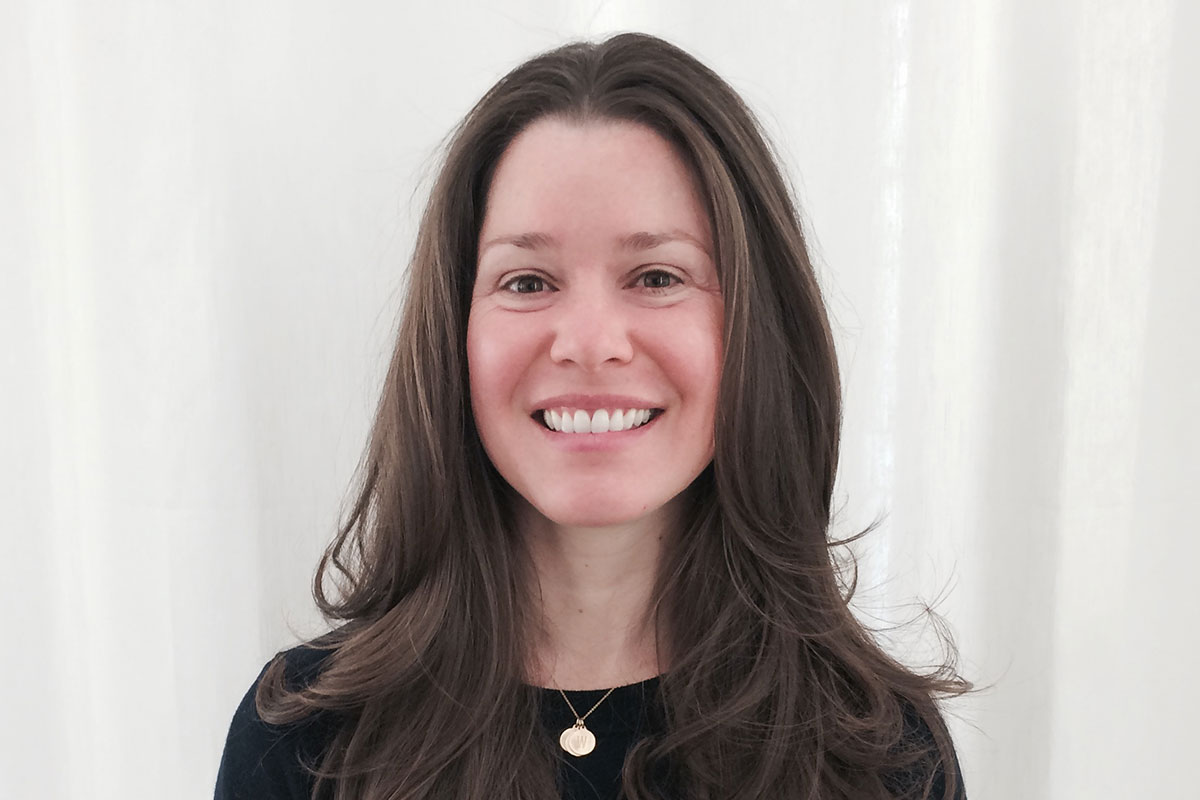As Cindy Wiltshire was working on her Teachers College dissertation early in 2019, she found herself repeatedly taking one particular book — Children at Risk in Schools, by Robert Pianta and Daniel Walsh — out of TC’s Gottesman Libraries.
“At a certain point, I thought, I might as well just buy it — I’ll really use it in my research life — so I bought a used copy, sight unseen, from Amazon,” recalls Wiltshire, who received her Ed.D. in Early Childhood Education from the Department of Curriculum & Teaching in May.
The book came, and she spent some months mining it for quotes and other information before one day she happened to look at the name of the book’s previous owner, inscribed in ink on the inside front cover: Stephanie Rowley [TC’s Provost & Dean].
“I thought, wow, what are the chances of such a unique and coincidental connection,” Wiltshire says. “I emailed Provost Rowley and she said, ‘That’s incredible, where did you find it?’ Her best guess is that she left it on a bench somewhere at the University of Michigan [where Rowley previously served as a Professor of Psychology and Associate Vice President for Research].”

BOUND BY A BOOK Midway through her dissertation, Cindy Wiltshire discovered that a book she had purchased online had once been owned by TC Provost Stephanie Rowley. (Photos courtesy Cindy Wiltshire)
Wiltshire finds the connection uplifting on several levels. “It’s so striking that two people doing different work could find commonality through the literature,” she says. “As well, though we're separated by so much in terms of tenure and accomplishment as scholars, sharing this book with Provost Rowley reminded me of the possibility that lies ahead of me as I leave TC. But it’s also special because, while the book problematizes the labeling of children and schools as ‘at risk,’ the heart of its message is that relationships matter for all children — not only for academic success but especially for social and emotional well-being. This happy coincidence of having Provost Rowley’s book enabled me to kindle a new relationship with her during the pandemic, a time when relationships have been so terribly blunted. It was a chance for me to thank her for all the emails that she and President Bailey have sent out to the TC community in attempts to alleviate our stress this past year during what was already a tough academic journey.”
Graduates Gallery 2021
Meet some more of the amazing students who earned degrees from Teachers College this year.
Wiltshire’s understanding of stress and relationships for children labeled at risk comes from some deep experience. The daughter of parents who emigrated from Bolivia in their 20s, knowing no English, she was the first member of her family to attend college. She subsequently spent 20 years as a classroom teacher until a professional development session about the brain, given by the psychologist and education consultant JoAnn Deak, convinced her that “educators of children should learn how the brain develops, just as we learn about Dewey and Vygotsky and Freire.”
Wiltshire earned her master’s in Neuroscience & Education from TC in 2017, and has spent much of her time then and since working in the Neurocognition, Early Experience & Development (NEED) Lab of Kimberly Noble, Professor of Neuroscience & Education, who has made international headlines with her study of the relationship between poverty and children’s early brain development.
For her mixed-methods dissertation, Wiltshire reanalyzed an existing data set and thereafter conducted her own study of teacher stress, teacher warmth and children’s ability to regulate their emotions in pre-K classrooms. She focused on Head Start programs, which serve a high proportion of children who are labeled “at risk.”
“We have such high hopes of closing the achievement gap through programs like Head Start, offering more school and school earlier for children labeled ‘at risk,’ but is that really going to happen if teachers themselves are deeply stressed by the conditions under which they’re operating?” she asks.
We have such high hopes of closing the achievement gap through programs like Head Start, offering more school and school earlier for children labeled ‘at risk,’ but is that really going to happen if teachers themselves are deeply stressed by the conditions under which they’re operating?
— Cindy Wiltshire (Ed.D. ’21)
To begin, Wiltshire reanalyzed data from the Chicago School Readiness Project (Raver et al., 2011), a randomized control intervention study begun in 2004. With the benefit of a sample of 600 children and 90 teachers, she was able to quantitatively analyze associations between three variables: teacher stress, teacher warmth, and children’s emotion regulation.
“The data demonstrated that both teacher stress and warmth were associated with increasing teacher-report of child dysregulation. We expected to see the stress result. We didn’t expect to see the warmth result.”
To better understand why teacher warmth would correlate with children’s inability to regulate their emotional responses, Wiltshire found teachers who were willing to speak about their experiences. Her qualitative findings, though unsurprising, point to a strained system.
Teachers are committed to their students and are resilient. At the same time, however, teachers are dealing with decisions made by people outside the classroom, those who don’t directly interact or engage with children. These outside decisions of curriculum, implementation, accountability and efficiency further stress teachers, forcing a sort of performativity, that may serve to limit their ability to model emotion and its regulation, and to be genuinely warm for and with their students.
— Cindy Wiltshire (Ed.D. ’21)
“Teachers are committed to their students and are resilient,” she says. “At the same time, however, teachers are dealing with decisions made by people outside the classroom, those who don’t directly interact or engage with children. These outside decisions of curriculum, implementation, accountability and efficiency further stress teachers, forcing a sort of performativity, that may serve to limit their ability to model emotion and its regulation, and to be genuinely warm for and with their students. These changes in teacher behavior may have consequences for children’s outcomes.”
Taken together, Wiltshire says, the quantitative and qualitative data “tell a story of Head Start teachers who work as caretakers under stressful conditions, both personally and professionally, and in this last year, through a global pandemic. Teachers understand the importance of engendering warmth in their classrooms for the benefit of their students, not just socially and emotionally, but for academic gains, too. Yet, teachers speak to a real tension that can divide their attention and focus from the children to a bureaucracy that may limit child outcomes. If that’s the case for Head Start teachers, then can it really be said that Head Start is doing all it can to close the achievement gap? When teachers are under increasing loads of stress, education writ large misses opportunities to benefit children and families no matter how much or how early schooling is aimed at children labeled as ‘at risk.’”
For Wiltshire, her study also a reaffirmed a key lesson of her work with Noble: the importance of mixed-methods research that pairs quantitative and qualitative approaches.
“I was lucky to investigate a national data set and color it with nuances of individual experience,” she says. “The takeaways are so much richer when you can do that.”
I was lucky to investigate a national data set and color it with nuances of individual experience. The takeaways are so much richer when you can do that.
— Cindy Wiltshire (Ed.D. ’21)
Wiltshire will have plenty of opportunity to apply that perspective in the future. This fall, she starts a job as an Assistant Professor of Early Childhood Education at the University of Texas at El Paso, right across the border from Mexico’s Ciudad Juarez. She’ll be conducting studies of communities, schools and families to see how relationships affect children’s academic and social and emotional outcomes.
“It means a lot to me, as a first-generation American, to be able to work in the Paso del Norte region, a major point of arrival for immigrants seeking entry to the U.S.” she says. “As a part of TC’s Convocation, I wrote a letter of thanks to one of my uncles for courageously leaving Bolivia ahead of his siblings. Were it not for him, my mom wouldn’t have come to the U.S. There’s a straight line from him to her, to me graduating from TC with a doctorate and now going to work in a Latinx population.” With the addition of sharing a book with TC’s Provost, she says, “things couldn’t have been scripted better, and I’m so grateful for the opportunity.”
